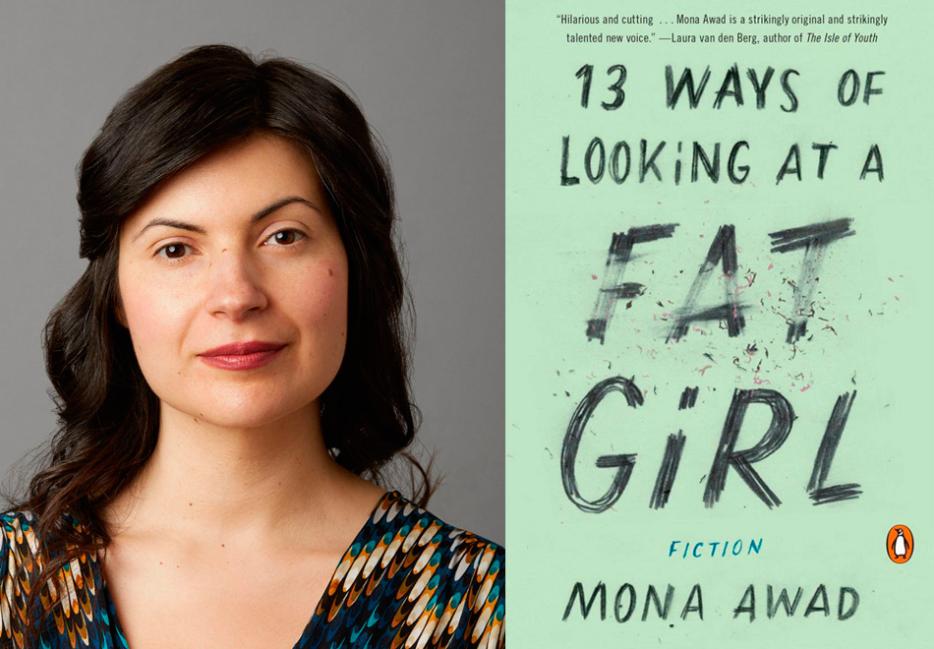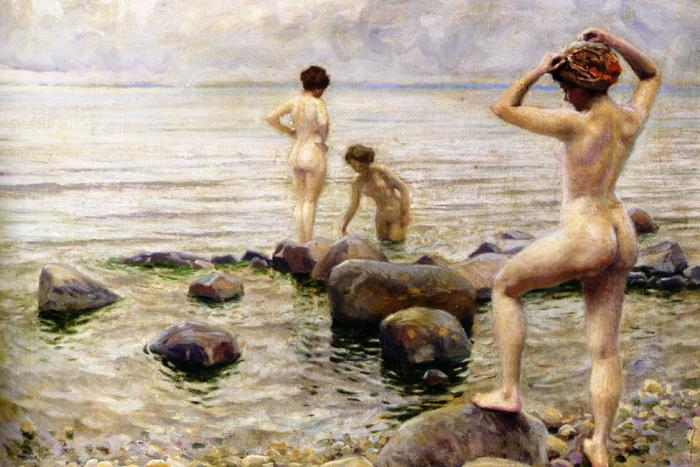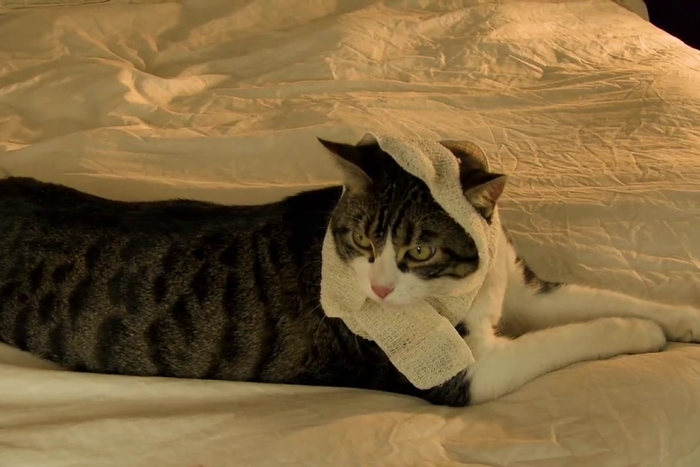Mona Awad likes sparkling rosé, too. I am always a little taken aback when people don’t like it; it’s pink AND fizzy. So, like, the drink of royalty, as far as I’m concerned. I am put at ease when she orders first and I get to turn to the waitress and say, “I’ll have what she’s having.”
“I’ve been trying to drink this just as a celebration,” she says. Her novel, 13 Ways of Looking at a Fat Girl, is finally done. “This book took six years to write.” I agree to join her, although the only thing I’m celebrating is having been able to leave work a couple of hours early to do this interview. But Mona really does have a lot to celebrate: 13 Ways is being received very warmly, and she’s already started working on her next project. We’ve settled into a little corner of the Ritz Bar, next to one of the fireplaces, the exact spot you would pick to post up for hours eating all those (hopefully free) nuts your server keeps bringing.
Lauren Mitchell: You’re happy to be back in Toronto for a little visit?
Mona Awad: Totally, it’s been so nice. A lot of the book was inspired by the city.
I found the opening story incredibly relatable as someone who has struggled with weight my whole life. I wonder, do people now come to you and want to speak very candidly and openly about stuff like that?
Yeah, and it’s actually really great and I’m glad, I really love that. I was hoping, you know, that people who struggle with this relate to it, that it rings true. That was one of the most important things for me, in writing it. You know, it’s something I’ve struggled with my whole life which is part of the reason I wanted to write it and explore how body image just affects so many aspects of our lives, like, all of our relationships. So, the book kind of allowed me to do that, and people come to me and they tell me that yeah, I can relate to that moment in the dressing room or I can relate to being a teenager and being bored in the afternoon and kind of becoming aware of your body and feeling like an outsider. I’m really thrilled.
On Cavern of Secrets, the podcast I host for Hazlitt, I mentioned my struggle with weight and starting to work out again and trying to do it not for this ideal. My relationship with exercise is doing it till I’m skinny and then I stop, and it’s been my constant life circle. It was crazy to me how many people emailed me or tweeted at me. It opened up this huge dialogue which I think is so important.
Yeah, absolutely, and that’s something the book does too. The transformation does not yield a fairy tale happy ending at all in this book, actually. The protagonist, Lizzie, still has to contend with all that shit. I mean, it asks the question: when we change our bodies, do we REALLY change? Or is there something else to address, something far deeper? Is it just window dressing for something else, you know, a deeper kind of identity struggle? So, she’s definitely going through that, and I think that that’s an important part of the book. It’s kind of questioning, when we go through that kind of transformation, do we leave that person behind, can we really leave that person behind or is who we were still informing who we are and the way we see the world and the way we see ourselves when we look in the mirror and the way we interact with people? You know, she’s still kind of haunted by her ghosts, her demons.
I think that’s interesting, too, because I feel like the weight loss narrative is very much, change your life, change yourself. I think changing that narrative is really important. For you, growing up, you also struggled with weight issues and that’s still something you deal with now as an adult?
Oh definitely. I mean, I honestly think anyone with a body who has to look in a mirror in existing culture deals with it to some extent, but I have definitely dealt with it. I’ve yo-yo-ed, I’ve gone up and down pretty drastically, so yeah, it’s definitely something that still kind of informs the way I look at myself and the way that I behave and I think that’s true for a lot of people. I think another question the book is asking as well is, how much energy does that cost? What is the cost of that? Like all of that life, being used up, thinking about that kind of stuff. I mean, some of it is productive, some of it is great, some of it feels, you know, health, physical wellbeing and you know, emotional wellbeing, and that’s great, but there’s another more negative aspect of that kind of preoccupation that I think the book is taking up.
I mean, there’s a capitalistic cost to everyone feeling okay about themselves.
Absolutely. Absolutely. In the book there’s a recurring narrative where my character goes into a dressing room and she’s struggling with all of these clothes. Why does she keep going back? Why does she keep going back to try on these fucking clothes when they don’t work? There is something messed up in that, that I think is a cultural problem. I think it’s a problem that perhaps culture wants us to have and that this character is very much a victim of. I don’t know to what extent, and the book asks this question, to what extent can we get outside of it? To what extent can we ever get outside of that?
I don’t know. It’s so ingrained now, and I think it’s interesting, when you read back on history, and it’s like, oh well, this body shape was popular at this time and now it’s like this, and people always want to compare it, like it was ever important? You know what I mean? ‘Back when Marilyn Monroe was around, we appreciated a curvy body,’ and it’s like, it’s just different body standards that not everyone can live up to.
Exactly. It’s still these really punishing aesthetics, like even now, this whole notion on America’s Next Top Model, I don’t know if you ever watch that show—
Oh, buddy! I’ve watched it!
The fiercely real woman? Like, give me a break! That woman is still an impossible ideal, she’s perfect! You know, I don’t understand how that’s supposed to fix stuff for us or make us feel better. It’s just punishing, ultimately.
I found that even in the body positive community, even there, some people don’t want to use the word fat. They want to use “curvy” or whatever, but not everyone who is fat has that body type.
It was a decision from the very beginning of the book to put that word, ‘fat,’ on the cover, and I felt very strongly about it, in part because it is so charged, it is so provocative, it can be seen as an insult. It is very hard to imagine yourself, or see yourself that way, or to be seen that way, but I wanted to put it on there to complicate it, to subvert it, to challenge it, to explore all the ways in which it can manifest in your life, regardless of body, regardless of your flesh, you know? You can see yourself that way, I think, briefly, no matter what. And so, that was really important to me, even though I think it’s a taboo word still. I really do.
Oh, for sure. And I think that because it’s such a taboo word, when fat activists, or people in that movement, take the word fat and use it in a positive light, people get burned up about that. It’s so ingrained, even in the medical community. I have friends who are like, 'I feel terrible, I feel so sick,' but they won’t go to the doctor, because the first thing they’ll tell you to do is lose weight. So, there’s that ingrained bias against seeing it as something not only beautiful or acceptable, but as healthy.
That’s true. We have a long way to go. We really do. I mean, I would like to think all of these, like you’re saying, all of these kinds of movements, you would think there’s been some sort of cultural adjustment causing people to look at themselves differently, in ways that are more positive, and I can’t deny that maybe that is happening on some level, but when I overhear some conversations, like when I’m sitting at a bar and I overhear women, or when I’m in the dressing room trying something on and I overhear women talking about their bodies, I don’t know how much has changed. I think that’s another reason why I wrote the book.
I think as a society we have a lot of unlearning to do on that sort of thing. Even myself, as someone who consciously tries to not look at myself in a negative way, even when I’m not feeling good. But it’s hard.
It is hard, it’s like, can we step outside of that culture, and you’re right, there’s a capitalist element to it, and can we step outside of that? Long enough to feel good in our own skin? Or is something going to come fuck that up, whether it’s a person talking, because they’re in it, and then you have to listen to them being in it and then you feel suddenly not good any more, or is it just going into a store and having a bad experience? There are so many ways that that little grasp on feeling good about yourself gets taken away, so quickly, just by being alive and being in the world and being around people and existing and so, I mean, I think that’s a problem, you know?
I have friends who are super into fitness and very obsessed with that kind of stuff, and I've had conversations with them when I've had to be like, I can’t talk at length about this with you because it makes me feel very judged, because no matter what I do, I don’t fit the certain body ideal that some people strive for. So I think that’s another thing, any time we talk about weight, or health related to weight, or fitness or whatever, I think we have to be empathetic to the person you’re talking to, because it’s so internalized, it’s hard to empathize with people.
And that’s one of the reasons I wrote the book. A lot of it was drawn from moments when I was overweight, having to hear people do exactly that. You know, where they just don’t have the sensitivity or empathy, they’re just not conscious of it, then you're subject to this, I don’t know, you’re just like, why can’t you see?? Frankly, it was just like that, it was like, why can’t you see that that’s not something I would be comfortable hearing? And that weird disconnect between people, I was really interested in that in this book and that’s definitely one of the reasons why I wrote it.
It’s interesting to me that you come from this super academic world, but the book doesn’t read as overly academic. I mean, it’s clearly not a fun beach read or whatever, but they’re teenagers, it’s very much like the way you think when you’re a teenage girl, and so I wonder, is that style of writing frowned upon in academia? Were you going out on a limb when you were writing that?
I think I was. With the book, the whole time, I was trying for real emotional honesty. I was trying to make it very voice heavy, really interior, I really wanted to inhabit this woman’s skin, and I wanted it to feel very visceral. Every story is in the present tense, for that reason. I wanted people to feel it. I tried to really stay inside this woman’s head and I think that might be why it reads that way. I took inspiration more from musicians that I really like, I wanted it to feel immediate.
Even though I didn’t grow up in the GTA, I grew up in a very small town, outside of Waterloo, and all we ever did when we were teenagers was hang out at the fucking Tim Hortons or the McDonald’s parking lot, I mean, we were doing the same shit. I was immediately dropped into that. It felt familiar even though I’d never read it before. So often that happens to me with music, more than it happens to me with books, even books that I feel nostalgia for.
I think that’s true. I guess I was trying to do that in some way because it’s about the body, you know? You want to feel close, you want it to feel really close.
Do you have other creative pursuits other than writing?
Dance.
Oh, really? I’m obsessed with people who are good at dancing.
Oh, I’m not good [laughs] but I love it, and I persist, and I think that’s important.
Me too!
And I think it’s good to persist at something you’re bad at, and like, still gain pleasure from it somehow.
What kind of dance do you do?
I did flamenco for a little while, I’ve done gothic burlesque, and I’ve done belly dancing, and I did ballet and tap and jazz as a child.
That’s so sweet!
I’m really into all of the dance, I love it.
It’s quite joyous.
It’s much more immediate then writing, you know, the release of it. In writing, it’s hard to trust yourself, it’s hard to make decisions about what’s good. I often second guess myself and I think there is something very free about dancing, there is something very brave-making about it, that I can then take to writing. I don’t know if that makes sense.
Writing is the opposite of being physical.
Yeah, you’ve got to sit there, and you get shoulder tendonitis and all sorts of weird shit. It kills your body.
A lot of writers that I know, the only creative thing they do is write. I know some writers who are like, well, I’m not a very creative person, I’m just a writer, and that is an insane thing to me, to say.
No, I know it’s true. And I love music too, I love it. I don’t think I could ever write a song, I want music to stay magical. If I don’t understand the mechanics of it, then that’s probably a good thing in some way. Perhaps it would deepen my appreciation of it on some level but I like it staying a mystery. Do you play music?
No, I did vocal training for years when I was a kid, so I was in a lot of choirs, but I stopped. I have a nice singing voice, but I wish I could open my mouth and some kind of Adele-type situation would be happening, but it’s not the case.
That’s okay. You know, I know what you mean, there is something so immediate about the human voice, my god.
Yeah, that sort of natural ability, like when people open their mouths or when they start dancing and you’re like, woah, that looks like the most natural thing in the whole world! Like, I can barely walk in a straight line [laughs].
Same. I lived in Scotland for a year when I was doing my masters and it was so weird because, maybe it was a weirdly discombobulating city, but it felt like everyone was constantly doing this when they were walking [makes wavy back and forth motion with hands] and like, what is going on, now I’m not walking in a straight line either. We can’t do this, we’re never gonna survive Scotland! And yet somehow we did! [laughs]
Is part of your creative process being a bit nudged?
Yeah, it’s good that I have to do it, but I think doing Fat Girl, and forcing myself to finish and stay committed to it over the course of six years, taught me a lot. Now I can get up and I’m not so afraid, I used to be so afraid to face my writing, I was so afraid of it, now I’m less afraid. I think I understand that, you just have to sit there. And you’ve just gotta wait.
That’s so fascinating. I find too sometimes that if I do something with my comedy or whatever, to go back to it, and to get at it head on and to analyze your own work, that’s the scariest thing.
Yeah, it’s true, it’s really, really true. To face it, just to face it, is very terrifying.
Sometimes it’s just like, Ugh, I’m so embarrassed for myself [laughs].
[Laughs] I know! And it’s like, this book was a hard issue, it was a hard issue for me, and so confronting it and forcing myself to confront it, I can now confront my work better. I can deal with days when they’re not so good, I can trust, or I can hope that the next day will be better.
Oh man. That’s goals, that’s goals for me.
That’s the good thing about finishing the project. The next thing will have its challenges but I think I feel more equipped to deal with those dark periods you have no matter what. When you’re creative, it’s part of it.
I think an important part of creative growth is knowing yourself in a different way than you did before you started, just because you’re digging deep, more so than if you were just analyzing your life or whatever. Because, the stuff that comes out of creative work is surprising
That’s the best part, when you surprise yourself. That’s why you do it, right? When I did stick to writing the book those moments when I did get surprised, or when it was joyous, or I was really into a moment, those were such great gifts. But I wouldn’t have gotten those if I hadn’t gone through all those times where I was afraid.






